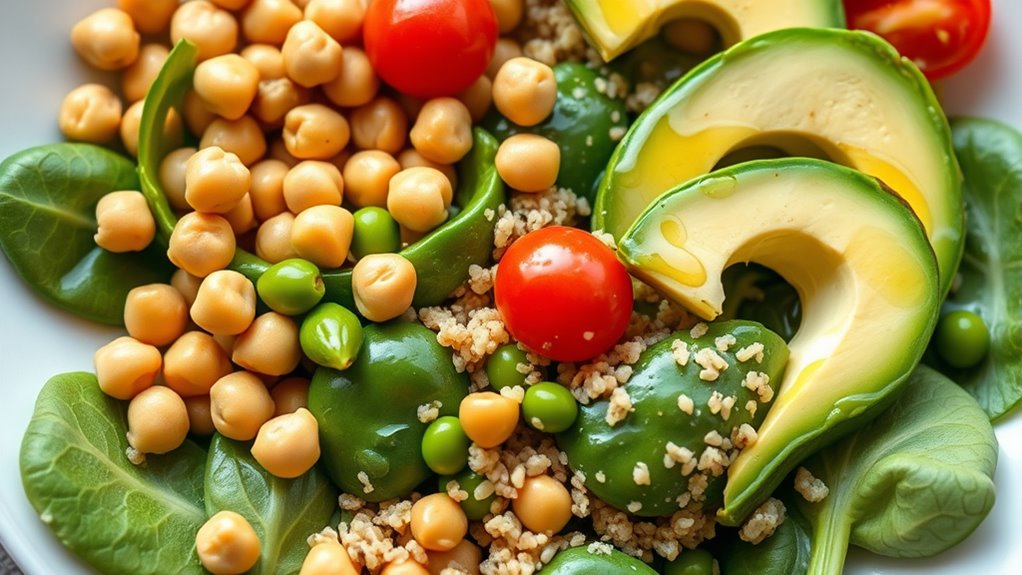Switching to plant-based proteins helps you meet your nutritional needs while supporting environmental sustainability. These proteins are versatile, easy to incorporate into your meals, and offer a complete or nearly complete amino acid profile. They’re also better for your health, being lower in saturated fats and rich in fiber, antioxidants, and phytochemicals. Embracing plant proteins promotes ethical choices and helps reduce your carbon footprint. Keep exploring to discover how you can make sustainable, nourishing choices every day.
Key Takeaways
- Plant-based proteins provide complete or near-complete amino acid profiles, supporting diverse dietary needs without meat.
- They offer sustainable, environmentally friendly options that reduce carbon footprints and conserve water and land resources.
- Rich in fiber, antioxidants, and phytochemicals, plant proteins promote better digestion and overall health.
- These proteins are versatile and can be incorporated into various meals like smoothies, baked goods, and cereals.
- Choosing plant-based proteins aligns with ethical, ecological, and health-conscious lifestyle choices for a sustainable future.

Plant-based protein has gained popularity as a healthy and sustainable alternative to animal products. As you explore your options for meeting your protein needs, you’ll find that many plant-based sources are produced through sustainable farming practices. These methods emphasize soil health, water conservation, and reduced greenhouse gas emissions, making plant-based proteins an environmentally friendly choice. By choosing products from farms committed to sustainable farming, you contribute to reducing your carbon footprint while nourishing your body.
Choosing sustainable, plant-based proteins supports environmental health and reduces your carbon footprint.
One of the benefits of incorporating plant-based supplements into your diet is their versatility. You can add powders like pea, rice, or hemp protein to smoothies, oatmeal, or baked goods. These supplements are crafted to provide complete or nearly complete amino acid profiles, ensuring you get the nutrients your body needs. Unlike some traditional animal-based options, plant-based supplements often undergo minimal processing, preserving more of their natural nutrients. This means you’re not only supporting your health but also making a conscious decision to promote sustainable farming practices that prioritize environmental health.
Many people turn to plant-based proteins because they’re easier on digestion and can be part of a balanced diet that aligns with ethical values. When you choose plant-based options, you’re supporting a shift away from intensive animal farming, which is often associated with significant ecological impacts. Sustainable farming methods for plant-based sources help conserve water, reduce land degradation, and minimize pollution. These practices ensure that your protein intake aligns with a broader commitment to environmental stewardship. Recognizing angel numbers by paying attention to recurring numbers can deepen your awareness of the connections between your choices and their impact on the planet. By choosing plant-based supplements, you’re also supporting local farmers and communities that adopt sustainable farming techniques, fostering a more resilient and equitable food system.
Moreover, plant-based proteins often come with additional health benefits. They’re generally lower in saturated fat and cholesterol, and rich in fiber, antioxidants, and phytochemicals. These nutrients can support your overall health, boost your immune system, and help maintain a healthy weight. As you incorporate more plant-based proteins into your diet, you’re making a positive impact on your well-being and the planet simultaneously. It’s a win-win situation: nourishing yourself with nutrient-dense foods while supporting sustainable farming practices that protect our environment.
In essence, embracing plant-based protein means making mindful choices that benefit both your health and the planet. Whether through whole foods like beans, lentils, and nuts or through specialized plant-based supplements, you’re participating in a movement toward more sustainable, ethical, and health-conscious eating. Your decision to prioritize plant-based options can lead to a more balanced diet and a healthier planet for future generations.
Frequently Asked Questions
How Do Plant Proteins Compare to Animal Proteins in Amino Acid Quality?
When comparing plant and animal proteins, you’ll find differences in amino acid profiles and protein digestibility. Plant proteins often have incomplete amino acid profiles, meaning they lack some essential amino acids, but combining different sources can remedy this. Animal proteins usually offer complete amino acid profiles with higher digestibility. So, while plant proteins can meet your needs, you might need to eat a variety to ensure you get all essential amino acids.
Can Plant-Based Proteins Support Muscle Growth Effectively?
Imagine fueling your muscles with plant-based proteins that support your goals. You can absolutely support muscle growth with plant proteins by focusing on variety and proper intake. They promote effective protein absorption and aid muscle recovery just like animal proteins. With strategic choices, your body gets the amino acids it needs, and your muscles stay strong. Embrace plant-based options, and you’ll see results without sacrificing your dietary preferences.
Are Plant Proteins Suitable for Children and Pregnant Women?
You wonder if plant proteins are suitable for children and pregnant women. In child nutrition and pregnancy safety, plant-based proteins can be beneficial if you choose a variety of sources to guarantee essential amino acids. However, you should consult healthcare professionals to confirm dietary choices. With proper planning, plant proteins can support growth and development, making them a safe, nutritious option for both children and pregnant women.
What Is the Environmental Impact of Producing Plant-Based Proteins?
Imagine the 21st century’s version of the wheel, plant-based proteins markedly reduce your carbon footprint. Producing these proteins supports sustainable farming by requiring less land, water, and energy compared to animal agriculture. This means fewer greenhouse gases and less environmental strain. You help combat climate change and preserve ecosystems with every plant-based meal. Embracing this shift makes your choices more eco-friendly, turning you into a modern-day hero for the planet.
How Can I Ensure a Balanced Diet With Plant-Based Proteins?
To guarantee a balanced diet with plant-based proteins, focus on smart meal planning by including a variety of sources like beans, lentils, tofu, and nuts. This helps you get all essential amino acids and supports ideal nutrient absorption. Mix different foods to enhance digestion and maximize benefits. Keep track of your intake to avoid deficiencies, and consider combining foods strategically for complete protein profiles every day.
Conclusion
Choosing plant-based protein lets you nourish your body without sacrificing ethics or flavor. While meat may satisfy your taste buds today, plants offer sustainable strength for tomorrow. By embracing these options, you’re not just making a healthier choice—you’re supporting a cleaner planet. It’s a reminder that sometimes, the simplest foods can be the most powerful. Ultimately, your decision today shapes the world you’ll inherit—so why not choose a future rooted in compassion and sustainability?








